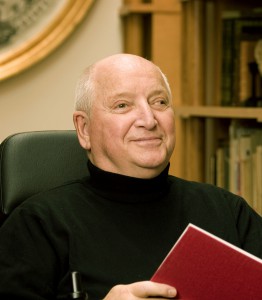Michael Graves Live: A Conversation About Recent Designs, Change, and the Future of the Portland Building
Alessi teapots, Target clocks, Disney Dolphin Hotels and the Washington Monument restoration—Michael Graves has influenced a generation of American design with a breadth few architects in history have matched. But it was the cream, salmon and blue-colored Portland Building, published on a 1982 cover of Time magazine, that first introduced Graves and the architectural movement of postmodernism to the wider world.
Arguably Portland’s most demonstrative contribution to architectural history, the Portland Building also has been an equally notorious problem: long-loathed by city employees who work inside and plagued with structural problems and leaks. The City of Portland is pondering the landmark’s future. Who better to ask what should happen than its designer?
The University of Oregon’s John Yeon Center and the Portland Art Museum collaborated to present, “Michael Graves Live” on Thursday, October 9 at the museum’s Fields Ballroom. This event was organized in conjunction with Design Week Portland 2014.
In a live, sold-out, on-stage chat with journalist and Yeon Center director Randy Gragg, Graves explored two topics: 1) his career’s evolution since the Portland Building, and, in particular, since an infection rendered him a paraplegic in 2003 inspiring a turn to designing everything from wheelchairs to housing for disabled veterans; and 2) what of the Portland Building should be preserved and what might change during its upcoming renovation. The lecture is available to view on the Portland Art Museum online recording.
Completed in 1981, the Portland Building became an instant icon of the Postmodernist break from the cookie-cutter corporate modernism that had come to dominate architecture, particularly in public buildings. It was successfully listed on the National Historic Register in 2012. Yet built for less than a common commercial office building of the era, the cut-rate budget led to dreary interiors and devastating leaks. After considering several options for the Portland Building—among them demolishing it, the City of Portland will soon solicit proposals from developers, architects and contractors for a remodel.
Few architects might understand the need for adaption better than Graves, now 80, winner of the Presidential Medal of the Arts in 1999 and the American Institute of Architects Gold Medal in 2001. Ignoring what he thought to be a minor sinus problem in 2003, he woke up to find himself paralyzed from the chest down by an infection that had invaded his brain and spine. But soon after, Graves turned to designing different tools and surroundings for those living with disabilities, from the Prime TC, a replacement for the traditional hospital wheelchair, to the “Michael Graves Active Living Collection,” which includes showerheads, collapsible canes, walkers, and bath seats.
With an introduction by the John Yeon Center’s executive director, Randy Gragg, Graves also held an exclusive discussion at the University of Oregon in Portland on October 8 at the White Stag Block’s Event Room. Speaking to alumni from the University’s Product Design Program and currently enrolled UO students in Portland, Graves discussed current projects and answered questions about his career. Available online to listen here.
Read Brian Libby’s Portland Architecture coverage.
Read the OregonLive story by Rebecca Koffman.
The Portland Tribune’s follow up coverage.
Watch the KGW interview.
